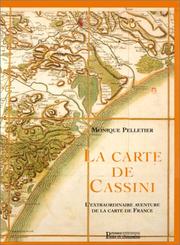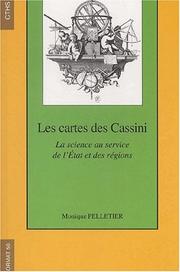| Listing 1 - 7 of 7 |
Sort by
|

ISBN: 2859781439 9782859781439 Year: 1990 Publisher: Paris : Presses de l'Ecole Nationale des Ponts et Chaussées,
Abstract | Keywords | Export | Availability | Bookmark
 Loading...
Loading...Choose an application
- Reference Manager
- EndNote
- RefWorks (Direct export to RefWorks)
Cassini, Cesar-Francois --- CASSINI (GIOVANNI DOMENICO), 1625-1712 --- GEOGRAPHIE --- GEOGRAPHIE HISTORIQUE --- CARTES GEOGRAPHIQUES --- CARTOGRAPHIE HISTORIQUE --- CARTOGRAPHIE --- BIOGRAPHIE --- HISTOIRE --- 18E SIECLE --- SOURCES --- FRANCE --- 16E-18E SIECLES
Digital
ISBN: 9783319634685 Year: 2017 Publisher: Cham Springer International Publishing
Abstract | Keywords | Export | Availability | Bookmark
 Loading...
Loading...Choose an application
- Reference Manager
- EndNote
- RefWorks (Direct export to RefWorks)
This book offers a fascinating account of the life and scientific achievements of Giovanni Domenico Cassini, or Cassini I, the most famous astronomer of his time, who is remembered today especially for his observations of the rings and satellites of Saturn and his earlier construction of the great meridian line in the Basilica of San Petronio in Bologna. The various stages of his life are recounted in an engaging style, from his early childhood in Perinaldo and his time at the famous Jesuit College in Genoa, to his later experiences in Bologna and Paris. The emphasis, however, is on the scientific side of his life. The book explores his impressive body of work in diverse fields while also drawing attention to the international character of his endeavors, the rigor of his research, and his outstanding management skills, which combined to make him an early embodiment of the “European scientist.” It was also these abilities that gained him the attention of the most powerfu l king in Europe, Louis XIV of France (the “Sun King”), under the auspices of whom he set up the Paris Observatory in 1671. He would go on to serve as Director of the Observatory, where he would make the majority of his scientific discoveries, for the rest of his life.
Science --- Pure sciences. Natural sciences (general) --- Space research --- Cosmology --- History --- wetenschapsgeschiedenis --- astrofysica --- popularisering wetenschap --- geschiedenis --- ruimte (astronomie) --- astronomie --- kosmologie --- Louis XIV [King of France] --- Cassini, Giovanni Domenico --- anno 1500-1599

ISBN: 2735505251 9782735505258 Year: 2002 Volume: 50 Publisher: Paris : Editions du C.T.H.S. (Comité des Travaux Historiques et Scientifiques du Ministère de l'éducation nationale, de l'enseignement et de la recherche),
Abstract | Keywords | Export | Availability | Bookmark
 Loading...
Loading...Choose an application
- Reference Manager
- EndNote
- RefWorks (Direct export to RefWorks)
Cassini familie --- Cassini family --- Famille Cassini --- Cartography --- Cartographie --- History --- Histoire --- Cassini, César-François, --- France --- Historical geography --- Géographie historique --- History. --- Cassini, César-François, --- Géographie historique --- Cassini, César-François --- Cartographers --- Cartography - France - History. --- Cartographie - France - Histoire - 18e siecle. --- Cassini (giovanni domenico), 1625-1712
Book
ISBN: 3319634682 3319634674 Year: 2017 Publisher: Cham : Springer International Publishing : Imprint: Springer,
Abstract | Keywords | Export | Availability | Bookmark
 Loading...
Loading...Choose an application
- Reference Manager
- EndNote
- RefWorks (Direct export to RefWorks)
This book offers a fascinating account of the life and scientific achievements of Giovanni Domenico Cassini, or Cassini I, the most famous astronomer of his time, who is remembered today especially for his observations of the rings and satellites of Saturn and his earlier construction of the great meridian line in the Basilica of San Petronio in Bologna. The various stages of his life are recounted in an engaging style, from his early childhood in Perinaldo and his time at the famous Jesuit College in Genoa, to his later experiences in Bologna and Paris. The emphasis, however, is on the scientific side of his life. The book explores his impressive body of work in diverse fields while also drawing attention to the international character of his endeavors, the rigor of his research, and his outstanding management skills, which combined to make him an early embodiment of the “European scientist.” It was also these abilities that gained him the attention of the most powerfu l king in Europe, Louis XIV of France (the “Sun King”), under the auspices of whom he set up the Paris Observatory in 1671. He would go on to serve as Director of the Observatory, where he would make the majority of his scientific discoveries, for the rest of his life.
Popular works. --- History. --- Astronomy. --- Astrophysics. --- Cosmology. --- Popular Science. --- Popular Science in Astronomy. --- Astronomy, Astrophysics and Cosmology. --- History of Science. --- Astronomers --- Cassini, Giovanni Domenico, --- Cassini, --- Cassinus, Joannes Domenicus, --- Cassini, Jean-Dominique, --- Cassini, Gian Domenico, --- Cassini, Gio. Domenico, --- Annals --- Auxiliary sciences of history --- Astronomical physics --- Astronomy --- Cosmic physics --- Physics
Book
ISBN: 9789811214592 9789811215315 9789811214608 9789811214615 Year: 2021 Publisher: Hackensack, NJ : World Scientific,
Abstract | Keywords | Export | Availability | Bookmark
 Loading...
Loading...Choose an application
- Reference Manager
- EndNote
- RefWorks (Direct export to RefWorks)
This book is a superposition of two distinct narratives : the first is historical, discussing the evolution of astronomical knowledge since the dawn of civilizations; the second is scientific, conveying mathematical and physical content of each advancement. Great scientists of antiquity, Middle Ages and modern times until the 18th century, are presented along with their discoveries, through short biographies and anecdotes. Special care is taken to explain their achievements using mathematical and physical concepts of their time, with modern perspective added only when ancient methodology is too cumbersome or its language hardly understandable to contemporary readers. The book conveys a lot of astronomical facts and data in a pleasant and accessible manner. Almost all findings and discoveries made in ancient times are followed by simple mathematical exercises using basic knowledge, so that the reader can check the assertions himself. The book contains a lot of inedited illustrations. Geometrical schemes are given extra attention to make the examples clear and understandable. The language is simple and accessible to the young audiencer.
Astronomy --- Astronomie --- History. --- Copernicus, Nicolaus. --- Brahe, Tycho, --- Galilei, Galileo, --- Kepler, Johannes, --- Newton, John, --- Huygens, Christiaan, --- Cassini, Giovanni Domenico, --- Halley, Edmond, --- Cavendish, Henry, --- Copernic, Nicolas --- Brahe, Tycho --- Galilei, Galileo --- Kepler, Johannes --- Newton, John --- Huygens, Christiaan, --- Cassini, Jean-Dominique --- Halley, Edmund --- Cavendish, Henry
Book
Year: 1960 Publisher: Paris : Marcel Rivière,
Abstract | Keywords | Export | Availability | Bookmark
 Loading...
Loading...Choose an application
- Reference Manager
- EndNote
- RefWorks (Direct export to RefWorks)
France --- France --- Ecole polytechnique (france) --- France --- Ecole centrale des arts et manufactures (france) --- Enseignement superieur --- Systeme metrique --- Gregoire (henri, dit l'abbe), ecclesiastique et homme politique francais, 1750-1831 --- Fourcroy (antoine francois, comte de), chimiste et homme politique francais, 1755-1809 --- Cassini (giovanni domenico), 1625-1712 --- Lavoisier (antoine laurent de), chimiste francais, 1743-1794 --- Histoire --- Histoire intellectuelle --- Histoire --- Conditions sociales --- France --- Histoire --- Biographie --- Influence --- Biographie --- Biographie --- France --- France --- Ecole polytechnique (france) --- France --- Ecole centrale des arts et manufactures (france) --- Enseignement superieur --- Systeme metrique --- Gregoire (henri, dit l'abbe), ecclesiastique et homme politique francais, 1750-1831 --- Fourcroy (antoine francois, comte de), chimiste et homme politique francais, 1755-1809 --- Cassini (giovanni domenico), 1625-1712 --- Lavoisier (antoine laurent de), chimiste francais, 1743-1794 --- Histoire --- 1789-1799 (revolution) --- Histoire intellectuelle --- 18e-19e siecles --- Histoire --- 18e siecle --- Conditions sociales --- Ingenieurs --- France --- 1789-1799 (revolution) --- Histoire --- Biographie --- Influence --- Biographie --- Biographie
Book
ISBN: 9789811249273 9789811247774 Year: 2024 Publisher: Hackensack, N.J. : World Scientific,
Abstract | Keywords | Export | Availability | Bookmark
 Loading...
Loading...Choose an application
- Reference Manager
- EndNote
- RefWorks (Direct export to RefWorks)
Today we know much about the sky: how stars are born, how they live and die, and how the universe as a whole evolves. We have learned of the existence of another type of matter, indifferent to light and yet decisive for the formation of galaxies, and we have a hint of a dark energy that since the last 4.5 billion years has taken over the control of the cosmos. We postulated and then discovered and even photographed black holes and listened to the faint rustle of the space-time ripple produced when these monsters devour each other. We reached these astonishing results (recognized by a bunch of Nobel Prizes and filling every day the media with wonders for the eyes and the mind) by the marriage of physics and astronomy that unified the Earth with the sky and then by the leap forward of science and technology in the Twentieth Century. This rich heritage has ancient roots. It was built by accumulating discoveries with errors, observations with fantasies, myths, and superstitions with flashes of genius, over a span of millennia, since Homo sapiens, turning his eyes to the immutable and perfect sky, began to ask questions. The book is a narration of the answers to these questions that had evolved over time: a progressive path, inserted in the general history, with some second thoughts and many obstacles. This is a saga of men and machines where greatness sometimes mixes with misery and passion often borders on sacrifice and even martyrdom. Why should we know it? Because our current knowledge is the result of these efforts and of the preconceptions that accompanied them. The challenge has been to present this complex and intricate subject without resorting to any formulas, so that it can be accessible to a wide audience of curious people, including high school and university students and in general all those who normally keep themselves informed of scientific things. A rich bibliography has also been added in the appendix for those wishing to learn more on one or more topics
Astronomy --- Astronomie --- History. --- Histoire. --- Copernicus, Nicolaus, --- Kepler, Johannes, --- Brahe, Tycho, --- Galilei, Galileo, --- Cassini, Giovanni Domenico, --- Huygens, Christiaan, --- Bradley, James, --- Newton, Isaac, --- Herschel, William, --- Rosse, William Parsons, --- Fraunhofer, Joseph von, --- Kirchhoff, G. --- Huggins, William, --- Hale, George Ellery, --- Aristarchus, --- Leavitt, Henrietta Swan, --- Galilei, Galileo, --- Copernic, Nicolas, --- Kepler, Johannes, --- Brahe, Tycho, --- Cassini, Jean-Dominique, --- Huygens, Christiaan, --- Bradley, James, --- Newton, Isaac, --- Herschel, William, --- Parsons, William, --- Huggins, William, --- Fraunhofer, Joseph von, --- Kirchhoff, Gustav, --- Aristarque de Samos, --- Leavitt, Henrietta Swan, --- Hale, George Ellery,
| Listing 1 - 7 of 7 |
Sort by
|

 Search
Search Feedback
Feedback About UniCat
About UniCat  Help
Help News
News